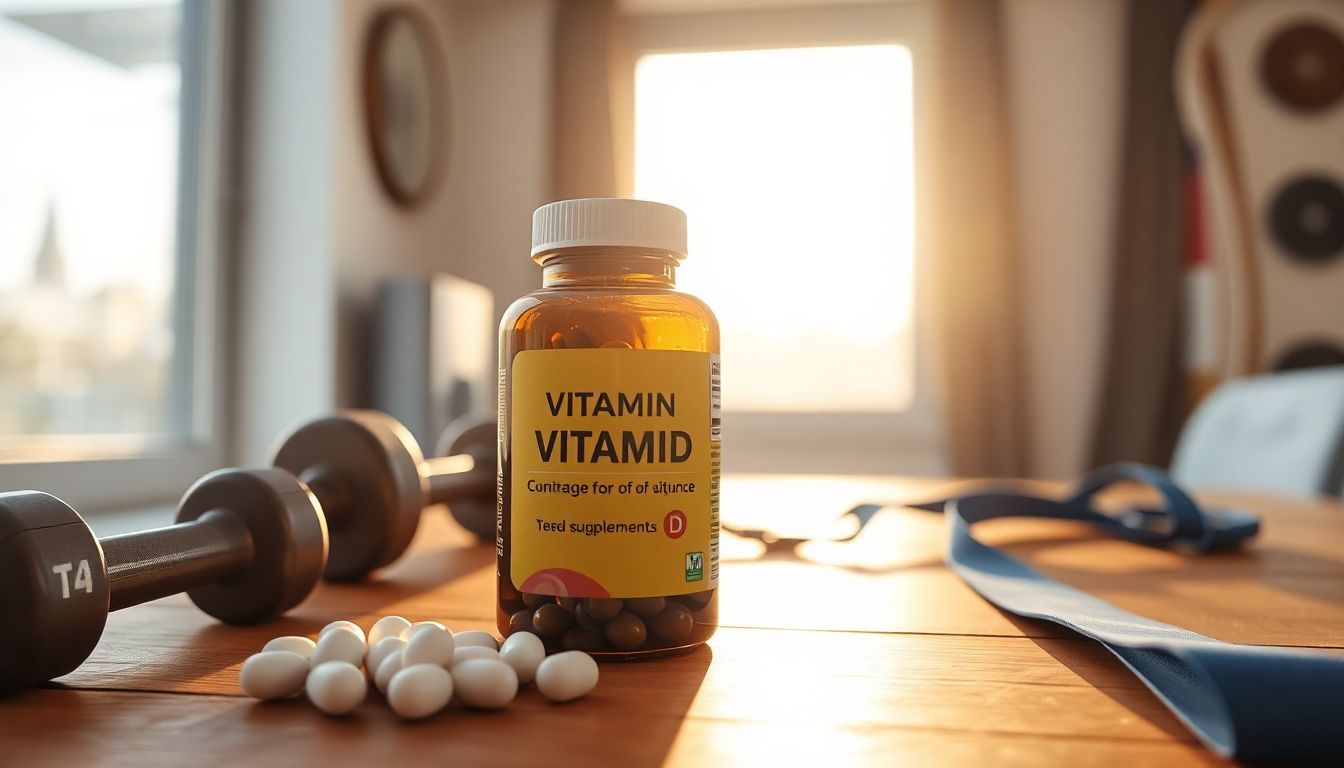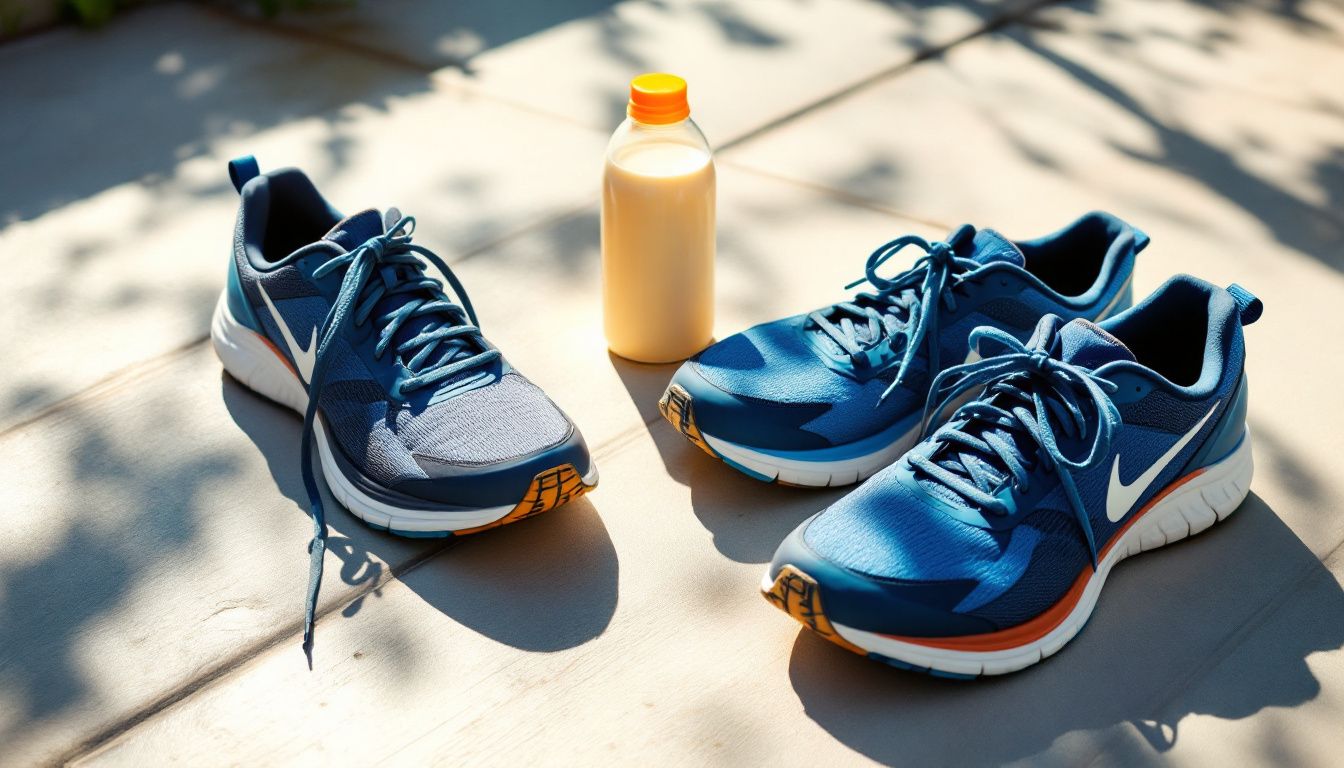Many people struggle with tired muscles and slow recovery after exercise. Did you know vitamin D might play a role in boosting physical strength and performance? This article explores how vitamin D levels affect athletes, older adults, and more.
Thank you for reading this post, don't forget to subscribe!Keep reading—it could change how you power through your day!
Key Takeaways
- Vitamin D boosts muscle strength, improves physical performance, and helps recovery. It supports type II muscle fibers for strong and quick actions like running or jumping.
- Higher vitamin D levels reduce risks of bone stress fractures, inflammation, and injuries. Athletes with enough exposure to sunlight tend to perform better than those training indoors.
- Older adults with low vitamin D risk weaker muscles, poor balance, and falls. A 2020 review showed that supplements improved their muscle strength significantly.
- Foods like fatty fish, fortified dairy products, egg yolks, mushrooms exposed to sunlight, and cod liver oil increase vitamin D naturally. Sunlight for 10–30 minutes several times a week also helps boost levels.
- Proper supplementation (600–800 IU daily) can support those with deficiencies due to limited sun or diet but should be taken under medical advice to prevent side effects like high calcium levels.
The Role of Vitamin D in Physical Performance
Vitamin D helps muscles work better. It also supports energy and strength during exercise.
Importance of Vitamin D for Bone Health and Immune Function
Calcium absorption depends on proper vitamin D levels. Without it, bones weaken and risk fractures or bone stress injuries. This is vital for both athletes and older adults. Vitamin D also helps maintain calcium homeostasis, ensuring strong skeletal support.
Low serum levels of vitamin D often lead to musculoskeletal injuries or conditions like osteoporosis.
The immune response relies on this nutrient too. It regulates inflammation by reducing pro-inflammatory cytokines like tumor necrosis factor (TNF). Calcitriol, the active form of vitamin D, strengthens the body against infections through its role in white blood cell function.
People with hypovitaminosis D may face weaker immunity and slower healing after injury or surgery. Sunlight exposure boosts natural production, improving overall health without heavy supplementation needs.
Potential Link Between Vitamin D Levels and Enhanced Physical Performance
Higher vitamin D levels may improve muscle strength and movement. Studies suggest this vitamin supports skeletal muscle cells, including type II muscle fibers responsible for quick, powerful actions like running or jumping.
It also aids calcium regulation in muscles, improving contraction and preventing fatigue during exercise. People with normal serum vitamin D often perform better physically than those with low levels.
Vitamin D helps the body manage energy use during activities. Athletes with higher intake show better results in tests like maximal oxygen uptake and isometric strength tasks. A random controlled trial found improved performance after supplementation of vitamin D3 in deficient individuals.
This nutrient also reduces risks of injuries like bone stress fractures or muscle atrophy by supporting bones and reducing inflammation markers like C-reactive protein.
Impact of Vitamin D on Specific Populations
Vitamin D affects people differently based on age and lifestyle. Its role in muscle function and injury recovery makes it important for certain groups.
Athletes
Athletes with good vitamin D levels often perform better. Studies show that low levels can lead to more injuries, like muscle strains or stress fractures. Soccer players and other outdoor athletes have fewer issues because they get sunlight exposure.
Indoor athletes may face higher risks of deficiency.
Low vitamin D can affect muscle power and increase injury risk.
Vitamin D helps muscles contract properly during intense activities—key for sports performance. It also supports calcium balance, keeping bones strong under pressure. Athletes with enough vitamin D recover faster from workouts and avoid common bone stress injuries.
Older Adults
Vitamin D plays a big role in keeping older adults strong. A 2020 systematic review showed that vitamin D supplementation could improve muscle strength significantly in this group.
As people age, their bodies may produce less vitamin D due to limited sunlight exposure and changes in diet.
Low vitamin D levels can lead to weaker muscles, poor balance, and higher fall risks. Keeping vitamin D levels normal helps with bone health and supports daily movements like walking or climbing stairs.
Foods like dairy products or fatty fish, combined with sunlight exposure, are simple ways to maintain these levels. Supplements can also be an option under medical advice.

Studies and Findings
Research shows vitamin D affects muscle strength and performance. Studies highlight how its levels impact athletes, older adults, and general physical health.
Meta-analyses and Systematic Reviews
Several studies have explored the relationship between vitamin D and physical performance. Meta-analyses and systematic reviews provide valuable insights by combining data from multiple studies. Here’s a breakdown of findings summarized in a table format for clarity:
| Study Focus | Key Findings | Population Studied |
|---|---|---|
| Muscle Strength | Higher vitamin D levels were linked to improved muscle strength in various groups. | Athletes, older adults, and general populations. |
| Physical Performance | Consistently low vitamin D levels correlated with reduced physical performance capabilities. | Diverse age groups and fitness levels. |
| Vitamin D Supplementation | Supplementation showed moderate improvements in muscle function and strength over time. | Athletes and those with vitamin D deficiencies. |
| Systematic Reviews | High vitamin D concentrations were linked to better athletic performance in most cases. | Primarily athletes and physically active individuals. |
Each finding highlights the potential role vitamin D plays in supporting physical health. Consistency in maintaining optimal levels appears to contribute significantly to better performance outcomes.
Effects of Vitamin D Supplementation on Muscle Strength
Vitamin D supplementation helps improve muscle strength. A systematic review from 2020 showed older adults gained significant muscle strength after taking vitamin D. This is critical since weak muscles increase the risk of falls and injuries in aging populations.
Athletes may also benefit from these supplements. They support better muscle contraction, power, and recovery. Enhanced calcium homeostasis linked with vitamin D boosts overall muscle function too.
Such benefits can lead perfectly into its role in athletic performance….
Relationship Between Vitamin D Levels and Athletic Performance
Higher vitamin D levels seem to support better athletic performance. Athletes with sufficient vitamin D often show stronger muscle function, faster recovery, and improved endurance.
Studies suggest that athletes who train outdoors, like soccer players, tend to have higher levels of this nutrient than indoor athletes. Low vitamin D increases the risk of muscle injuries and bone stress fractures, which can sideline sports careers.
Deficiency in this nutrient might also lower maximal oxygen consumption during intense physical activity. This affects aerobic capacity and stamina—key factors for peak performance.
Controlled trials indicate that proper supplementation helps restore optimal levels, strengthening muscles while reducing injury risks. Regular monitoring can track changes and ensure these benefits stay consistent over time.
Recommended Dietary Allowance and Food Sources
The amount of vitamin D you need can depend on your age, weight, and overall health. You can get it from foods like fatty fish or fortified dairy products, along with sunlight exposure.
RDA Guidelines
The recommended dietary allowance (RDA) for vitamin D is set between 600 to 800 IU daily. Adults aged 18-70 need about 600 IU, while those over 70 should aim for 800 IU. These numbers help maintain bone health and support the immune system.
For people with vitamin D deficiency, higher doses might be necessary. Always consult a doctor before increasing intake. Supplements like vitamin D2 or D3 can help meet these needs when sunlight exposure or natural food sources are limited.
Natural Food Sources of Vitamin D
Vitamin D plays a key role in bone health, muscle function, and immune response. Certain foods can help you meet your daily needs.
- Fatty fish like salmon, mackerel, and tuna are rich sources of vitamin D3. A 3-ounce serving of salmon provides about 570 IU of vitamin D.
- Fortified dairy products like milk and yogurt often contain added vitamin D2 or D3. Check labels to know the exact amount per serving.
- Egg yolks offer small amounts of vitamin D but are still helpful for boosting levels naturally.
- Cod liver oil is a concentrated source of vitamin D3, providing roughly 1,360 IU per tablespoon.
- Fortified cereals can provide anywhere from 40-100 IU of vitamin D per serving, depending on the brand.
- Mushrooms exposed to sunlight produce provitamin D2, making them a plant-based option for vegetarians.
- Cheese delivers lower levels compared to other options but contributes calcium necessary for bone strength too.
- Orange juice fortified with vitamin D is another convenient choice; one cup may contain about 100 IU.
These natural food sources make it easier to support calcium homeostasis and prevent deficiencies while improving overall health.
Strategies for Optimizing Vitamin D Levels
Boosting vitamin D can improve your health and physical performance. Learn simple steps to raise your levels through daily habits and lifestyle changes.
Regular Monitoring
Tracking vitamin D levels helps maintain good health. Blood tests can identify vitamin D deficiency early, preventing issues like weak bones or muscle injuries. Athletes, especially indoor athletes and soccer players, need this due to limited sunlight exposure during training.
Older adults should also monitor since their skin produces less vitamin D with age.
Regular checks are vital for those in low-sunlight areas. Testing ensures proper calcium homeostasis and immune response while reducing risks like bone stress injuries. Pair monitoring with dietary changes or supplements if needed—then move to strategies like sun exposure for natural boosts.
Sun Exposure
Regular checks help track vitamin D levels, but natural methods like sunlight can improve them too. Sun exposure triggers vitamin D synthesis in the skin. Aim for 10–30 minutes of sun several times a week without sunscreen.
Fair-skinned people may need less time, while darker skin requires more.
Spending time outside boosts mood and immune response alongside vitamin D production. Outdoor athletes benefit naturally from sunlight, unlike indoor athletes who might face deficiency risks.
Safe sun habits reduce overexposure risks yet maintain bone health and muscle function through calcium homeostasis supported by adequate vitamin D levels.
Dietary Changes
Fatty fish like salmon, mackerel, and tuna pack a punch of vitamin D. Egg yolks are another simple option for boosting your levels. Fortified dairy products such as milk and yogurt also help improve bone health and muscle function.
Low vitamin D levels can weaken muscles and increase injury risks. Add these foods to daily meals to support strong bones and better physical performance.
Consideration of Supplementation
Supplements may help if your vitamin D level is low. Diet and sunlight may not always provide enough. Indoor athletes, older adults, and those with darker skin might face a higher risk of vitamin D deficiency.
A daily dose of vitamin D supplements can close this gap effectively.
Vitamin D3 is preferred over Vitamin D2 since it raises levels more efficiently. Dosage depends on age, BMI, or current levels but often starts at 600–800 IU per day for most adults.
Too much can lead to problems like high calcium or kidney stones. Always check with a doctor before starting supplementation to ensure safe use… next steps include exploring dietary allowance and food sources!
Conclusion
Vitamin D plays a big role in physical health and performance. Studies show it can boost muscle strength, protect bones, and improve athletic results. Athletes and older adults benefit most from keeping vitamin D levels balanced.
Regular sunlight, good nutrition, or smart supplements help maintain these levels. Stay active—vitamin D might be your secret weapon!
